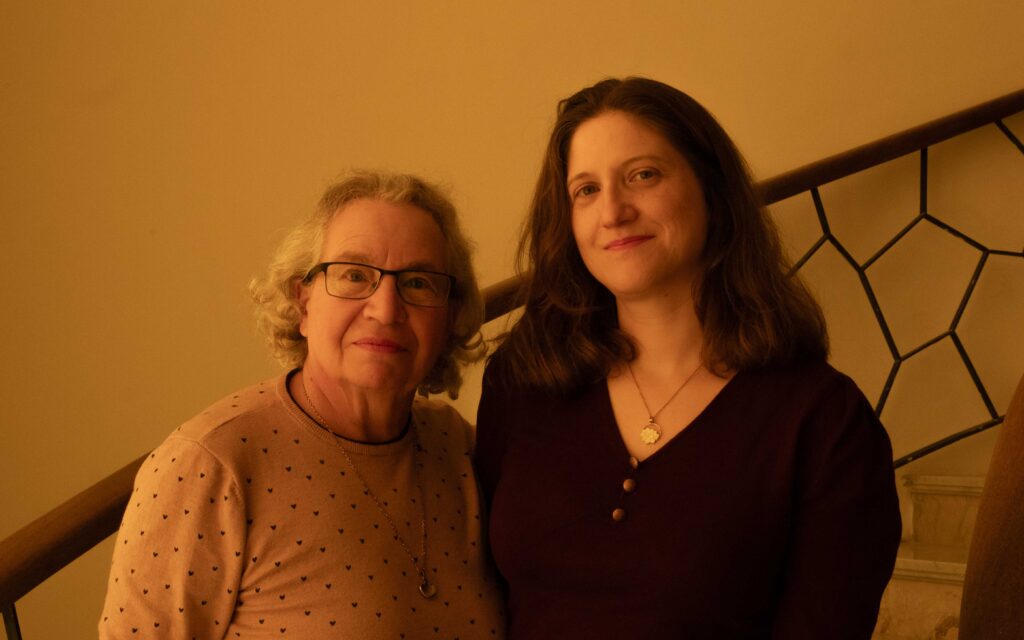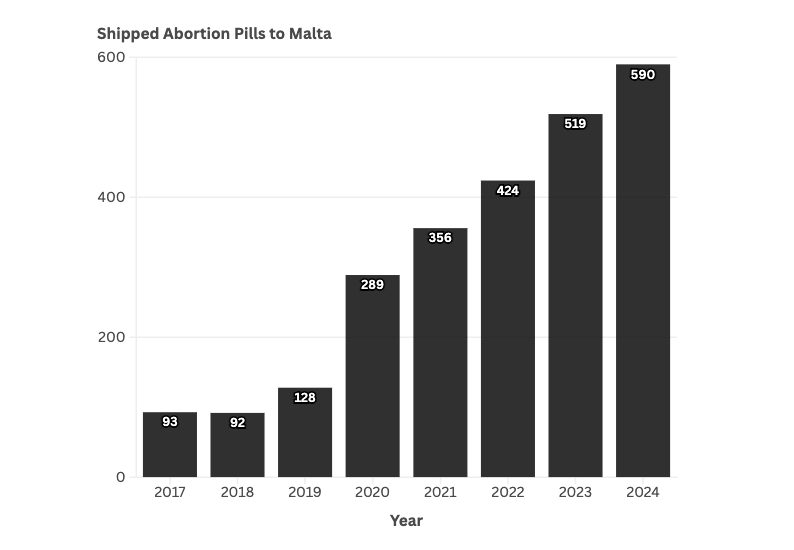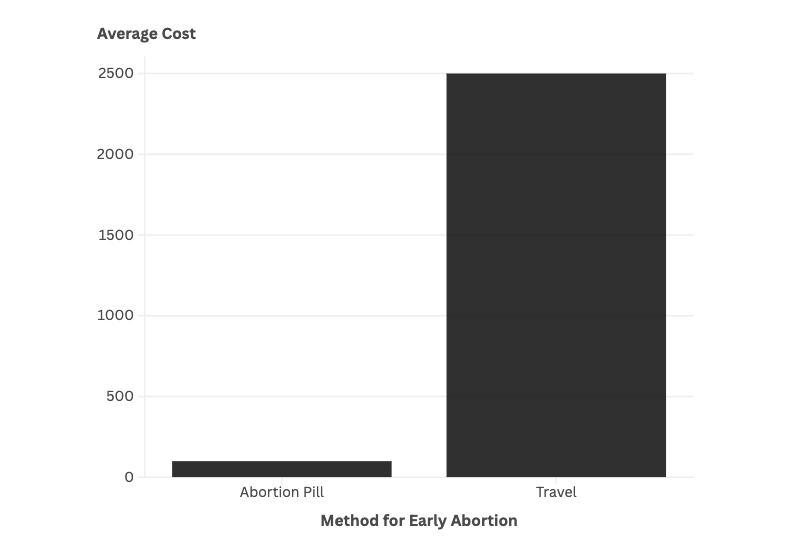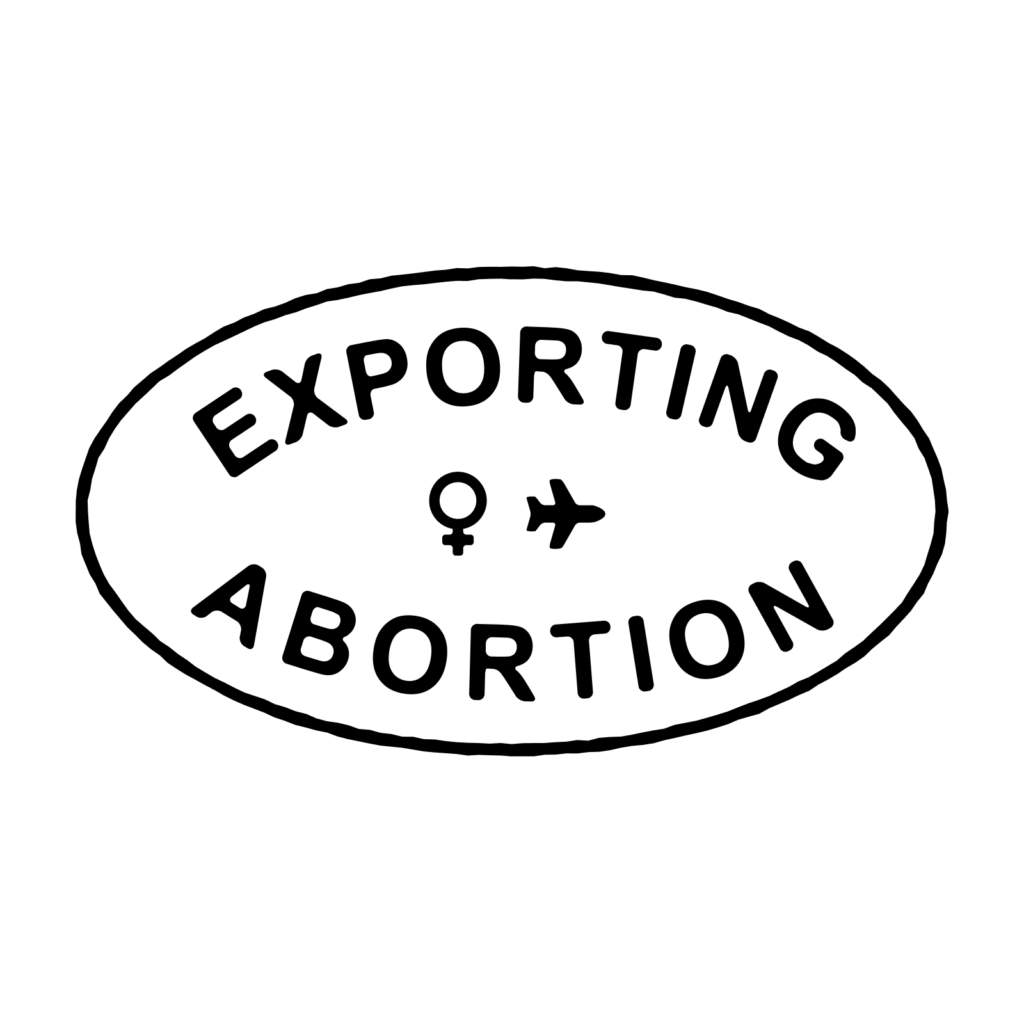by Joanna Demarco
- Abortion Pill Shipments Double in Four Years
- Four Police Reports, Two Arraignments Linked to Abortion Pills Since 2018
- Traveling for Abortion Up to 25 Times More Expensive Than Pills
“I remember sitting on the edge of the bathtub, Googling ‘abortion in Malta,’ then panicking, thinking they were going to trace my search back to my IP address… Imma paranojja ridikula. Well, it’s not ridiculous because it’s not unrealistic…”
*Stephanie was 25 and had just begun a new scholastic year working as a secondary school teacher when she unexpectedly became pregnant, despite using contraception.
Her abortion was one of over 2,000 cases in Malta in the past five years for which women have used pills shipped from international organisations that provide them, according to data kept by the two main abortion pill suppliers and shared with Amphora Media through local NGO Doctors for Choice. The data was shared as part of the European cross-border investigation Exporting Abortion, coordinated by Público (Spain).
The numbers signal that Malta’s near-total abortion ban has not stopped women from seeking abortions. Rather, access to abortion pills is increasingly leading to more self-managed terminations.
Yet, the framework of illegality and stigma fosters a climate of fear, risk, and isolation as these procedures continue to take place outside the healthcare system.
In an interview with Amphora Media, held in a private location, Stephanie described the experience of having an abortion within this climate as triggering “all the worst emotions” — fear, anger, shame and mistrust; including towards her siblings, her gynae and even her GP.
“You feel angry at the state, frustrated, you are nauseous and worried about the actual abortion and worried about being caught. So there are a lot of layers to the upset, because it is distressing… And that is what made the whole thing difficult. Not the procedure,” Stephanie said.
Dr Natalie Psaila Stabile, a specialist in family medicine and co-founder of Doctors for Choice Malta, speaks to women daily who want to have, or have had, abortions, through the NGO’s Abortion Doula Support Service that she helps run. The service offers women free, confidential abortion information and support.
Without hearing the interviewee’s story, she echoed Stephanie’s fears as ones expressed by the women she talks to.
“People get very concerned about the pills being stuck at customs or being found out… Some fear being reported by family members, partners, or even their ex-partners. Some are in abusive relationships where their partner wants them to keep the pregnancy, and they don’t — as this ties them down even more”.
The safety of pills purchased online, potential complications, and how to recognise excessive bleeding or failed procedures are other concerns the women who speak to Dr Psaila Stabile raise.

Psaila Stabile’s mother, Professor Isabel Stabile, a gynaecologist and the co-founder of Doctors for Choice Malta, told Amphora Media that from a medical point of view, the pills are safe, save for a “rare” occurrence of very heavy bleeding, which would require hospital care.
The latter is the scenario which women taking the pills fear – having to need to go to hospital and risk the chance of being found out.
Four Police Reports Linked to Abortion Pills Since 2018 – Two Arraigned
While the fear of being reported to the police is a main concern for women using abortion pills, since 2018, only four reports have been filed with the police in relation to the pills –two in 2023 and two in 2024.
Through a freedom of information request, Amphora Media found that two reports led to arraignments in court, one did not lead to any charges, and one is currently being investigated.
Additionally, a recent report by Voice For Choice revealed that between a longer timeframe – 2012 and November 2024 – three of seven reports on abortions that were sent to the police, were made by healthcare professionals, while the remaining four reports were filed by partners, former partners or family members.
Under Maltese law, it is legal to purchase the pills, possess them, and even consume them. It is only illegal to consume them while pregnant.
Malta has the strictest abortion laws in the EU – allowing a legal abortion only in cases where a woman has a medical complication which may put her life at immediate risk, or that places her health in grave jeopardy which may lead to death.
Under the Criminal Code, a woman who causes her own miscarriage or consents to an abortion can face 18 months to three years in prison. No one has been imprisoned for having an abortion in the last 25 years.
Abortion Pill Shipments Double in Four Years
The data provided to Amphora Media by Doctors for Choice lists shipments from the two main organisations that provide abortion pills: Women on Web and Women Help Women. The figures specifically account for pills ordered for immediate use, excluding precautionary or “advanced provision” orders.
Professor Stabile stated that the pills shipped “are taken”, thus making them a reliable indicator of how many abortions are occurring in Malta each year.

The numbers have surged, more than doubling since 2020. In 2024 alone, 590 shipments were made, almost double the 289 in 2020. Analysis shows that from 2020 to the end of 2024, there were over 2,000 instances women in Malta taking abortion pills.
However, due to the legal risks, these abortions happened without medical supervision and often without the support of a loved one.
“They are literally on their own, alone in the bathroom, bleeding with no one around them. That’s not the way to do it,” Stabile said.
The increase in the use of abortion pills has also been noticed through first-hand experience by Dr Psaila Stabile through the Doula Support Service.

A sample of logbook entries from 2024 shared with Amphora Media shows that a majority of calls are made during early pregnancy and are mostly inquiries about the abortion pill.
Stabile also highlighted specific cases she is aware of in which travel was not possible and access to pills has been crucial. In one instance, a migrant woman living in Malta’s detention centres ordered abortion pills after allegedly being raped at a detention centre in Libya. In Malta, abortion remains illegal in cases of rape and incest.
It is important to note that these 2000+ cases also do not include the number of pills that could have been purchased on the black market or from other providers. They also don’t include other potential instances of self-managed abortions.
Traveling for Abortion Up to 25 Times More Expensive Than Pills
Despite users knowing that it is illegal, women are still choosing to have abortion pills in Malta for practical and financial reasons, Professor Stabile explained.
“Women in Malta are generally not travelling in early pregnancy. They’re not. They don’t because it’s just so much easier to get the pills here,” she said.
Traditionally, Maltese women seeking abortions during early pregnancy would travel to countries such as the UK. However, the growing awareness of overseas medical abortion providers has offered a cheaper and more accessible alternative.
While the numbers for travelling in early pregnancy have dwindled and changed, women still travel for procedures following the 12-week time limit catered for by the pills.
The abortion pills – mifepristone and misoprostol – which are considered as safe options by the World Health Organisation cost 25 times less than traveling abroad for a procedure. While a medical abortion costs between €80 and €120, traveling for an abortion can cost between €2,000 and €3,000 (not including time taken off work, childcare costs, etc.)

Echoing Professor Stabile, Stephanie told Amphora Media that she decided to choose the pills over travelling, despite the illegality, for practical and financial reasons. “It’s less hassle, as you don’t have to look into flights and accommodation and coordinate your schedule with someone else to join you for support,” she said.
“It’s cheaper, because you don’t need flights and accommodation, and it’s less disruptive on life and responsibilities, at that time I also couldn’t afford to take a week off.”
“It’s a struggle not being able to trust anyone when you need help… (and) although that is what you decide — no one wants to go through having an abortion.. and it was made more difficult than it had to be simply because of the laws that affect it. It didn’t have to be like that,” she said.
Amphora Media reached out to Health Minister Jo-Etienne Abela for comment, however received no reply.
*the interviewee’s name was changed to protect her identity.


This investigation was developed with the support of Journalismfund Europe.
Exporting Abortion is a cross-border journalistic investigation coordinated by Público (Spain) in collaboration with European media and journalists from across Europe.
The journalists who have participated in this investigation are, in alphabetical order: Joana Ascensão (Portugal – Expresso), Kristina Bohmer (Slovakia), Magdalena Chrzczonowicz (Poland – OKO.press), Mayya Chernobylskaya (Germany), Nacho Calle (Spain – Público), Maria Delaney (Ireland – The Journal Investigates), Joanna Demarco (Malta), Armelle Desmaison (France), Emilia G. Morales (Spain – Público), Bru Noya (Andorra), Apolena Rychlíková (Czech Republic), Órla Ryan (Ireland – The Journal Investigates), Sergio Sangiao (Spain – Público), Margot Smolenaars (Netherlands – Follow The Money).

Leave a Reply